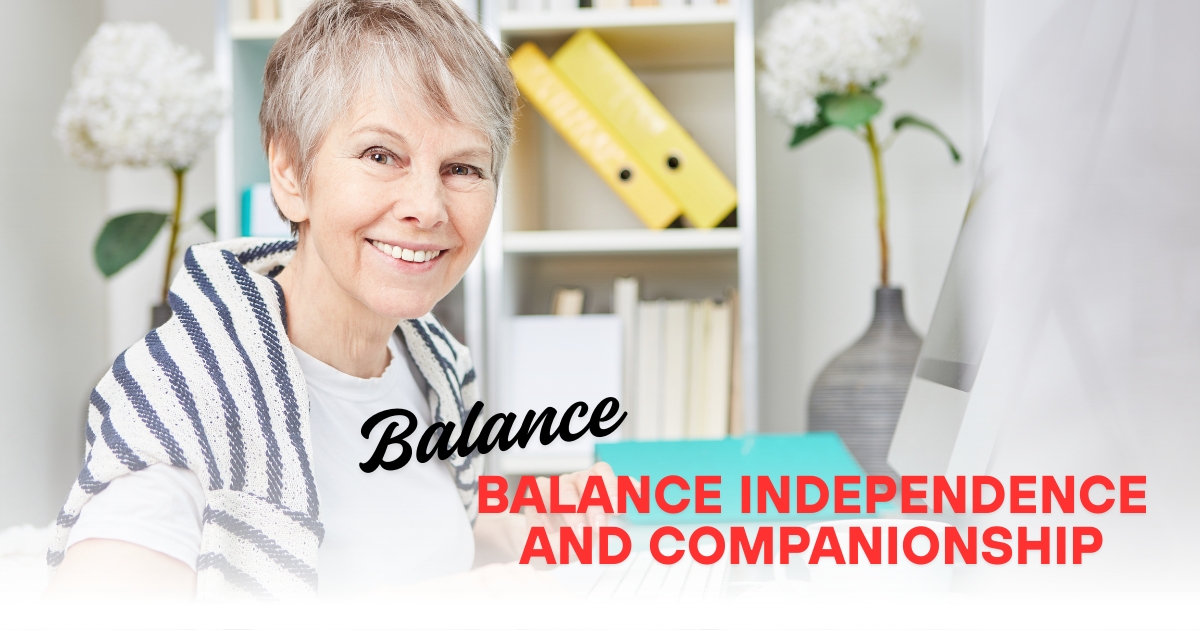
How to Balance Independence and Companionship in Late-Life Relationships
Building meaningful relationships in later life comes with its challenges and rewards. For mature singles, finding the right balance between independence and companionship is key to fostering a fulfilling connection. Healthy companionship for mature singles doesn’t mean giving up personal freedom or sacrificing individuality. Instead, it’s about maintaining the aspects of your life that make you who you are, while also nurturing a strong partnership.
This guide explores how you can maintain your independence while developing a loving relationship, and offers practical tips to ensure both you and your partner feel valued and free.
The Importance Of Independence In Late-Life Relationships
Independence is essential, no matter your age. By the time we reach our 50s or beyond, we’ve cultivated individual identities, interests, and lives full of experiences. These factors shape who we are and the relationships we form.
Remaining independent allows you to:
- Preserve your sense of self while building a connection.
- Prevent burnout when helping or supporting a partner.
- Keep your life enriched with personal hobbies, friends, and activities.
- Set healthy boundaries that enhance mutual respect.
An independent soul is a thriving soul. A mature relationship should complement, not consume, your individuality. Independence isn’t about shutting your partner out; it’s about staying whole as you connect with someone else.
How Love and Freedom Can Coexist
It’s a common misconception that love requires people to sacrifice freedom. However, a truly healthy companionship for mature singles thrives when both partners feel free to express themselves, pursue personal passions, and coexist harmoniously. Love strengthens when the relationship becomes an addition to your life, not the sole focus.
Here’s how you can combine freedom and love in a late-life relationship:
- Define What Independence Means to Both Partners
Everyone interprets independence differently. For some, it’s maintaining separate finances. For others, it’s keeping alone time or individual routines. Discuss what independence looks like for both of you to find common ground. - Communicate Your Needs Clearly
Be open about your desire for certain freedoms. If you need time alone to pursue a hobby or spend time with friends, share that with your partner. Good communication reduces feelings of rejection and fosters mutual understanding. - Respect Each Other’s Space
Allow space for your partner to live their own life alongside yours. Whether this involves career goals, friendships, or personal experiences, showing respect for their individuality reinforces trust and support. - Celebrate Differences
Appreciation matters. Celebrate your differences and how they enrich your relationship. Your partner’s individuality brings depth and variety to shared experiences. - Support, Don’t Control
Healthy relationships focus on supporting each other rather than controlling one another’s choices. Avoid micromanaging your partner’s time and decisions, as it can create tension.
By prioritizing love and freedom, you create a relationship where both of you can thrive as individuals and as partners.

Practical Ways To Balance Independence And Companionship
Striking this balance isn’t a one-time act; it’s an ongoing effort nurtured through thoughtful actions. Consider incorporating the following practices into your relationship:
Keep Separate Interests
- Pursue individual hobbies or activities that bring you joy. Whether it’s gardening, painting, traveling with friends, or volunteering, having interests outside the relationship provides personal fulfillment.
- Share stories about your separate activities with your partner. This fosters conversation and keeps things exciting.
Create Shared Experiences
- Bonding doesn’t mean giving up independence. Engage in shared interests, like learning to cook a new cuisine together, taking dance lessons, or planning weekend getaways.
- Discuss ideas for experiences that excite both of you and remain open to trying new things together.
Maintain Financial Independence
- Keep your finances healthy and separate unless you agree to a different arrangement. Financial autonomy is often critical for mature singles who have previously faced divorce or other complexities.
- Set clear expectations and boundaries regarding money to avoid misunderstandings.
Schedule Time Apart
- Set intentional time to do your own thing. Whether weekly or monthly, scheduled “me-time” helps replenish energy.
- View this space as something positive rather than avoidance. Distance can bring fresh perspectives and spark meaningful conversations later.
Avoid Over-Reliance
- Look to friends, family, and personal activities for fulfillment beyond your relationship. Over-reliance on a partner for emotional or social needs can create unnecessary pressure.
- Encourage your partner to maintain their networks and interests as well.
By implementing these steps, it becomes easier to create a relationship that respects each person’s independence while building a stronger connection.
Beyond Practical Tips: The Mindset Shift
Finding balance often starts from within. For mature singles, adopting a mindset that prioritizes growth, trust, and respect can make all the difference.
Think of independence and companionship as two sides of the same coin. While independence reflects self-confidence and inner strength, companionship fosters closeness and shared joy. They aren’t contradictory; they’re complementary.
Practice gratitude for the unique aspects of your relationship that allow space and support. Celebrate the love you’ve found, without guilt for devoting energy to personal goals and pursuits. A positive, proactive attitude makes it easier to blend freedom and connection.
This shift also requires examining any lingering fears of dependency or loneliness. Late-life relationships come with emotional baggage from past experiences. Taking the time to unpack these fears, either alone or through counseling, ensures they don’t overshadow your new connection.
Roadblocks and How to Overcome Them
Balancing independence and companionship isn’t always smooth sailing. Challenges can arise, but having strategies for addressing them helps keep the relationship healthy. Here are some common roadblocks and how to tackle them:
- Feeling Overlooked
Sometimes, one partner may feel neglected if the other prioritizes their independence too much.
Solution: Communicate openly. Share feelings without placing blame. Discuss ways to spend more quality time together. - Dependency Issues
On the flip side, overly relying on a partner can strain the relationship.
Solution: Assess whether you’re balancing your needs between your partner, friends, and family. Include other people in your support system. - Fear of Conflict
Couples may avoid discussing independence for fear of arguments.
Solution: Approach these conversations calmly and with mutual respect. Frame independence as beneficial for both partners rather than a point of contention. - Mismatched Expectations
Different preferences for alone time or togetherness can lead to resentment.
Solution: Be clear and honest about expectations early on. Work toward a compromise that satisfies both partners’ needs.
When difficulties arise, address them with empathy and teamwork. Every challenge is an opportunity to strengthen your connection.
The Rewards of Healthy Companionship
By living fully as individuals and strengthening your bond as a couple, you can achieve the best of both worlds. The right balance means you’ll enjoy:
- A deeper appreciation for shared time.
- Renewed excitement and curiosity about each other’s lives.
- Lower stress, knowing you’re both supported and free.
- Increased confidence, as you maintain personal autonomy within the relationship.
Late-life relationships are often richer and more resilient because they’re built on a foundation of experience, self-awareness, and clarity about what truly matters. By pursuing this balance, mature singles can create a fulfilling partnership while staying true to themselves.
Healthy companionship for mature singles isn’t about sacrificing one thing for another. Instead, it’s about weaving independence and connection together to form a relationship that nourishes both. Recognize the value of what you bring as an individual and combine that with the beauty of the shared love you’ve found.











